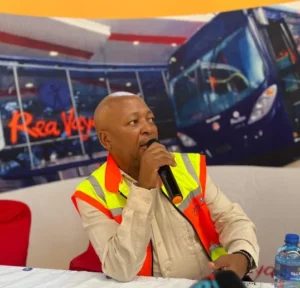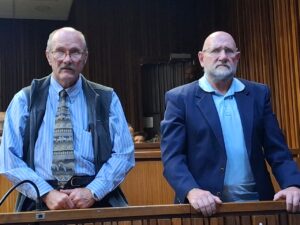By: Clyde N.S Ramalaine
Anglo-American’s recent statement on Thabi Leoka’s resignation and the subsequent revelations surrounding her allegedly misrepresented Ph.D. certificate from the London School of Economics (LSE) has sparked a multifaceted saga. As the Daily Investor let us into the unfolding drama, this discourse explores the interconnected issues of qualifications, preferential treatment, appointments, governance failure, and misrepresentations within the context of Leoka’s extensive professional engagements. It postulates a disservice to South Africa and Leoka respectively, and contends misrepresentations must extend beyond Leoka to include all entities she ever worked for or shared associations with, all in the name of a claimed PhD.
Anglo-American has published a statement regarding the resignation of Thabi Leoka as its board member and chair of subcommittees of the board. The Daily Investor captures the unfolding saga around Leoka and the claim of a Ph.D. certificate apparently earned from the London School of Economics [LSE]. Thabi Leoka has resigned from the board of Anglo American Platinum amidst allegations that she lied about obtaining a PhD from the London School of Economics (LSE). Amplats informed shareholders via a SENS announcement this afternoon that, at her request, Leoka resigned from her position as a non-executive director of the company. Consequently, she will also step down from the Amplats board committees she serves on with immediate effect. The company said she decided to resign to “attend to her health and the questions she has been facing about her academic qualifications.”

The Anglo-American announcement follows the Business Day report that Leoka, who serves on the boards of several companies, including Amplats and MTN SA, allegedly does not hold a Ph.D. in economics from LSE as she claims. The publication reported that this misrepresentation led to Johann Rupert-owned Remgro withdrawing her appointment before its AGM in December 2023 – just a few months after her appointment in March of that year.
Daily Investor contends that when Leoka first joined Remgro in March, her position was announced on SENS as follows – “The Board of directors of Remgro has approved the appointment of Dr. Thabi Leoka as an independent non-executive director of Remgro with effect from the close of business on 22 March 2023.” Dr. Leoka has considerable experience in the areas of finance and has a passion for emerging markets and African economies. “She obtained her PhD and MSc in Economics from the London School of Economics and also holds an MA in Economic Development and International Trade and a BA in Social Science from Wits University.” However, on 4 December, Remgro announced on SENS that the appointment of Leoka was withdrawn. Notably, they dropped the Dr. from her name. “The appointment of director Thabi Leoka was withdrawn at the AGM and therefore not voted on, as the director has advised the Board that she is no longer available to serve as an independent non-executive director of the Company.” A Remgro spokesperson told Business Day that Leoka would best address any allegations relating to her qualifications. An LSE spokesperson said Leoka had not obtained a Ph.D. from the university. “We have checked our files and can find no record of Thabi Leoka being awarded a PhD from LSE,” the spokesperson said.
Leoka has also served on the board of private healthcare group Netcare and, in 2019, was appointed to the presidential economic advisory council and the commission of inquiry into the Public Investment Corporation. Leoka maintained that the allegation that she does not have a Ph.D. from LSE is unfounded. She also provided an LSE PhD degree document to News24. She maintained she did obtain the degree from a world-renowned institution. Leoka has repeated these claims in a radio interview with 702. MTN South Africa has yet to release a statement addressing these allegations, and Leoka still serves on the company’s board. The SENS announcement on Leoka’s resignation is the first time Amplats has addressed the claims against her. The unfolding drama around Thabi Leoka has many angles, which I wish to congregate into my postulation of a disservice on so many fronts that attest to a disservice from and to Leoka.
Firstly, I extend my heartfelt wishes for Ms. Leoka’s swift restoration to good health. It is my sincere hope that she experiences a complete recovery.
Let me start by asking on how many boards and structures Ms. Leoka has served. In order to appreciate this, we look at her public resume: We know of the Anglo Board, Netcare Board, and ACT Afrique Group, which captures Thabi LEOKA, a South African national, as an economist who has worked for various organizations in the financial sector.
Thabi LEOKA was a member of the Commission of Inquiry into the Public Investment Corporation, the largest pension fund in Africa, based in South Africa. She was also appointed by the South African Minister of Finance to review the system of taxation of staple goods to support the country’s poor and vulnerable. Thabi LEOKA is currently an independent director of MTN South Africa, Anglo-American Platinum, and the Small Business Institute.
Leoka began her career as an economist with Investec Asset Management in South Africa and London. She also worked as an emerging markets economist at Barclays Bank in London, before becoming the head of economic research for South Africa at Standard Bank and then chief economist for South Africa at Renaissance Capital. Thabi was named the 2017 Economist of the Year by ABSIP. She writes regularly for various publications in South Africa and abroad. Leoka holds a Ph.D. in Economics from the University of London, an MSc in Economics and Economic History from the London School of Economics, and an MA (Hons) from the University of the Witwatersrand. Leoka thus served on Anglo America Platinum and Small Business Institute, Netcare, and MTN South Africa, and is still an advisor to the Presidency.

On the 17th of January, News 24 reported that in the aftermath of the Daily Maverick exposé on Thabi Leoka’s elusive ‘Ph.D.’ certificate, the Presidency has asked Ms. Leoka to clear up this issue for transparency’s sake. The issue is Ms. Leoka is serving as an economic advisor to the presidency, meaning the presidency, no dissimilar to the list of private companies, failed to do any due diligence on the credentials. It speaks volumes for vetting. I shall postulate the Leoka case is perhaps the signpost that shows the intertwined nature of the State and Private business under Ramaphosa, which may be the unspoken issue.
Now let me turn to what I think the resignations and as in the case of Remgro’s withdrawal[s] and possibly further expected announcements communicate.
A postulated Disservice to South Africa and Thabi Leoka
It is the contention of this musing that the Thabi Leoka situation manifests as a disservice to South Africa and its citizenry on several fronts. One, it underscores potential lapses in due diligence and vetting processes within both public and private entities, as evidenced by the contested academic qualifications. This failure in scrutiny extends beyond Leoka to the organizational structures that appointed her to influential positions, raising concerns about the integrity of selection processes and the adherence to meritocratic principles. Two, the controversy surrounding Leoka’s alleged misrepresentation creates a narrative of preferential treatment, potentially sidelining genuinely qualified candidates. This erodes trust in the fairness of appointments and perpetuates a sense of disillusionment among those who aspire to contribute meaningfully to the nation’s progress. Lastly, the interconnection between state and private business, as highlighted in Leoka’s various roles, exposes a broader systemic challenge that warrants examination. The situation serves as a wake-up call for South Africa to address deficiencies in governance, transparency, and the delicate balance required between public and private sector interests for the collective benefit of the nation and its citizens. Leoka’s case is perhaps another pivotal moment that also highlights the uncritical intertwining and interconnectedness, if not questionable proximity, between State and Private Sector entities—an anomaly particularly pronounced and noticeable during the Ramaphosa years of governance. While the Zuma years were associated with and manifested the Gupta company association, there is no lack of evidence from Ramaphosa’s initial ascent to political power regarding who he was representing in the business context of South Africa.
Initially, it is now tenable to acknowledge that Ms. Leoka unequivocally lacks the purported qualifications she has asserted over a protracted duration, during which she, on numerous occasions, was afforded preferential treatment over alternative candidates. Despite my empathetic understanding of her health predicament, her resignation on grounds of health appears unnecessary, serving as a perceived stratagem to divert attention from the substantive matter at hand – the absence of a legitimate Ph.D. certificate is a document that should ostensibly be readily producible. The assertion that Ms. Leoka lacks the claimed qualifications is substantiated by a careful examination of her prolonged tenure, during which instances of preferential treatment were recurrent. This observation indicates a plausible consistent deviation from established merit-based selection criteria on the part of all entities that employed her. Thus, the cumulative evidence suggests a deliberate attempt to obfuscate the core issue, reinforcing the sustainable deduction that Ms. Leoka’s proclaimed qualifications lack substantive validation.
Secondly, Ms. Leoka’s ascension to the positions, notwithstanding the absence of requisite qualifications, elicits a palpable disquiet as she superseded candidates equally adept however duly qualified if a qualification in certification of a PhD constituted the significant deciding factor for appointment. This appointment not only engenders a lingering sense of discontent but also perpetuates the systemic marginalisation of individuals, who consistently find themselves sidelined due to the prevalence of opportunistic factional politics an endemic reality the ANC bequeathed South Africa.
The inimical impact of factionalism within the ANC which extends to the SA state, particularly under the leadership of President Ramaphosa or any of the leaders connected to him who espouses such practices, manifests in the perpetual sidelining of individuals, irrespective of their duly verified qualifications, skills, credentials and expertise, in favour of those perceived as loyal to the CR17/22 faction. I fear no reprise to assert here and now that I find myself among those consistently marginalised, notwithstanding my ANC- Deployment Committee endorsement for an ambassadorial position dating back to an ANC deployment meeting held on 28 August 2015 as relayed on the same day by the late ANC – DSG Jessie Duarte who was the secretary of that meeting. I had silently wished for the DA’s success in unveiling the minutes of all deployments, aiming to demonstrate that my absence in serving my country is unrelated to my skills, experience, expertise, or earned qualifications. Rather, it is solely due to my public disapproval of Ramaphosa as both the leader of the ANC and South Africa. This assertion does not stem from a sense of entitlement but rather from a discernible pattern of exclusion resulting from my non-endorsement of the Ramaphosa presidency, a stance substantiated by the numerous articles I have authored critiquing this administration.
This departure from meritocratic principles not only undermines the principles of fair governance but also obstructs the infusion of top-tier talent into key positions. The elevation of individuals based on political allegiance and patronage rather than competence results in a compromised pool of decision-makers, hindering the country’s capacity for advancement and sustainable growth. The systemic preference for political loyalty over professional merit perpetuates a culture of cronyism, weakening the fabric of institutions and impeding the nation’s progress by negating the potential contributions of highly qualified and capable individuals.
The sustainability of this deduction asserting Ms. Leoka’s ascent without the necessary qualifications lies in a dual examination of the circumstances surrounding her appointment. I thus shall postulate my argument premised on two fronts. One, the overt absence of the requisite qualifications implies a departure from established norms and standards, raising concerns about the integrity of the selection process both in private and public sector entities associated with Leoka. This departure becomes particularly pronounced when contrasting Ms. Leoka’s qualifications with those of other candidates who were evidently more adept and duly qualified for the position.
Two, the resultant disquiet and discontent generated by her appointment underscore its controversial nature. The palpable disquiet emerges not merely from the absence of qualifications but from the perception of preferential treatment, allowing Ms. Leoka to supersede individuals demonstrably more qualified. This state of affairs perpetuates a systemic marginalization, impacting not only the credibility of the selection process but also reinforcing a pattern of sidelining competent individuals in favour of those aligned with opportunistic factional politics. In essence, the sustained contention stems from a comprehensive evaluation of Ms. Leoka’s appointment, considering both the evident absence of qualifications and the broader implications it carries for fair and meritocratic practices within the organisational and political landscape.
Thirdly, regrettably and without the intention of detracting from Ms. Leoka’s capacities or competencies, a warranted inquiry arises concerning the nature of her appointment – whether it was solely a result of meritorious considerations or purely influenced by political directives from higher authorities. The validity of this contention is rooted in a nuanced examination of the circumstances surrounding Ms. Leoka’s appointment comes anchored in three levels. The regrettable aspect underscores a cognizance of her capacities and competencies, indicating that the inquiry is not intended to disparage her professional acumen. This acknowledgment establishes a foundation of objectivity, assuring that the subsequent inquiry is driven by a genuine quest for transparency rather than a predisposition against Ms. Leoka.
The warranted inquiry into the nature of her appointment is propelled by the recognition that the determination of her suitability for the position may not be solely attributed to meritorious considerations. The use of the term “warranted” implies a logical basis for questioning, considering the potential influence of political directives from higher authorities. This acknowledgment stems from the understanding that appointments within certain organisational or political contexts may be influenced by factors beyond individual merits, such as political affiliations or directives.
Therefore, the contention holds as it navigates a balanced path, recognizing Ms. Leoka’s capabilities while acknowledging the legitimate need to scrutinize the broader dynamics influencing her appointment. It seeks to ensure a thorough understanding of whether the selection process was driven primarily by meritocratic principles or influenced by external political factors, contributing to a comprehensive and logical assessment of the circumstances.
In the fourth instance, an imperative inquiry arises: What does Ms. Leoka’s successive appointments to pivotal positions, whether within private or public sector entities, signify for the efficacy of the governance checks and balances within these organizations and entities? Notably, Ms. Leoka emerged as a prominent figure, positioned to ascend to the role of Deputy Governor of the Reserve Bank as a successor to Kuben Naidoo, indicative of a trajectory toward advancement rather than regression. While the exact criteria guiding this progression remain uncertain, it is incumbent upon us to acknowledge the possibility of merit-based considerations. As alluded already the principle objective is not to cast aspersions on Ms. Leoka; however, it is crucial to confront the challenge of elucidating the factors that distinguished her as the preferred candidate in each instance, particularly where the possession of a PhD purportedly played a pivotal role.
Moreover, the multifaceted nature of Ms. Leoka’s engagements, coupled with her role as an inspirational speaker, prompts concern. What to do with the many youth that heard her speak facilitated by her role in society as manifested in both public and private executive roles?
A discourse partner I engaged with raised a pertinent question: How can South Africa anticipate the Reserve Bank to scrutinize alleged transgressions of the president, such as the Phala Phala unresolved crimes—where the NPA, more than 19 months following the case’s opening, cannot confirm if any police officer ever knocked on Ramaphosa’s door regarding the serious claims—when it seemingly fell short in conducting due diligence on Thabi Leoka’s contested PhD credentials? It is not unfair to deduce that, given Ms. Leoka’s ascent and consideration as Deputy Governor, she was on her way to becoming SARB Governor— certainly the first black female and the second female after Gill Marcus.
Ms. Leoka’s prominence and her potential ascent to the role of Deputy Governor of the Reserve Bank are central to this deduction. The acknowledgment of her trajectory towards advancement, as opposed to regression, adds a temporal dimension to the argument, highlighting the progressive nature of her career path. The uncertainty surrounding the exact criteria guiding this progression introduces an element of ambiguity, compelling a closer examination of the factors contributing to her notable advancements.
The deduction furthermore holds weight as it delicately navigates the terrain between acknowledging the possibility of merit-based considerations and abstaining from casting unwarranted aspersions on Ms. Leoka. It is my conviction that such a balanced approach ensures that the inquiry is not accusatory but rather seeks clarity on the distinguishing factors that positioned her as the preferred candidate in each instance where she was preferred to others.
Lastly, the deleterious implications extend further to Ms. Leoka, as none of the corporate entities or organisations wherein she has occupied executive and board roles hitherto have provided evidence of her incapacity or incompetence. Notably, companies of the stature of Anglo America, Netcare, MTN SA, the PIC, the Presidency, and the inquiries she made part of among others, have all refrained from issuing statements to the South African public, acknowledging any deficiency in her ability to fulfill the diverse responsibilities associated with her positions. The absence of any official pronouncement pertaining to her alleged incapacity or ineptitude raises pertinent questions about the transparency and communication protocols of these entities in appraising and addressing the performance of their leadership figure. This observation prompts consideration: if the entities Ms. Leoka has been associated with have not encountered substantive challenges with her performance thus far, signifying a perceived competence in executing her professional duties, the imperative arises to question the disproportionate emphasis placed on the possession of a Ph.D. qualification in her case.
The argument hinges on the observation that entities of significant stature, such as Anglo America, Netcare, MTN SA, The PIC, and The Presidency, have refrained from issuing any official statements acknowledging deficiencies in Ms. Leoka’s ability to fulfill her responsibilities.
This observation serves as a foundation for the contention, raising substantial questions about the transparency and communication protocols of these esteemed organizations. The deliberate choice of entities with considerable influence, coupled with the absence of any official pronouncements regarding Ms. Leoka’s capacity or competence, contributes to the persuasive nature of the contention.
Moreover, this contention introduces a crucial consideration: the incongruity between the perceived competence in executing professional duties and the disproportionate emphasis on possessing a PhD qualification.
As we conclude, permit me to make a statement on the subject of misrepresentation, of which Ms. Leoka stands accused, not only by the public but strangely also by those who employed her in executive, commissioner – role, and/or board designations. I wish to categorically assert that placing the locus of misrepresentation solely on Leoka is necessarily hypocritical, as it inadvertently exonerates the companies, entities, and structures she has served in, implicating them as complicit in such misrepresentation.
If the allegations of misrepresentation against Ms. Leoka prove to be true, it follows that every entity that employed her cannot be considered an innocent bystander and natural adjudicator in this matter. The responsibility for misrepresentation should not solely rest on Ms. Leoka but must be collectively owned by the companies, organisations, entities, and the presidency, that contracted her. In the case of entities such as Anglo America MTN-SA, despite their international standing, these entities stand accused of endorsing and perpetuating the misrepresentation by allowing Ms. Leoka to hold influential positions without proper scrutiny of her credentials. In such a scenario, the misrepresentation becomes a shared liability, as these organisations, by not adequately verifying her qualifications, inadvertently misrepresented their boards and executives to South Africa and its people. The issue extends beyond an individual’s misrepresentation to a systemic failure within these entities to uphold transparency and integrity in their appointments. The entities must, therefore, shoulder the consequences of their oversight and contribute to rectifying any potential damage to public trust and confidence in their governance structures. If morality is the subject, that questionable morality if logic prevails extends itself to every entity that propagated Leoka as part of them.











I appreciate your insightful post. It was actually pretty fun. You seem to have reached a far more agreeable level now. But how can we continue to communicate?
Your point of view caught my eye and was very interesting. Thanks. I have a question for you.
Your point of view caught my eye and was very interesting. Thanks. I have a question for you.